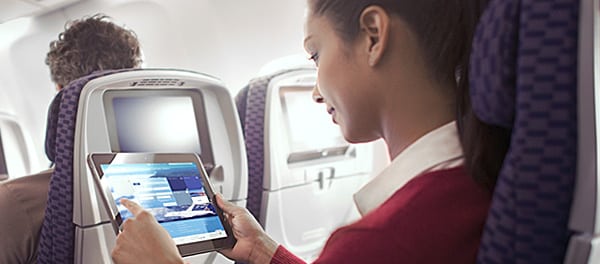[Avionics Today 09-17-2015] At Wednesday’s Aviation Festival in London, airlines admitted they were barely halfway through their digital transformation strategies as they look to make their investments in Wi-Fi, both for passengers and improving operations.
 |
| Airlines are looking at ways to improve their digital transformation strategies. Photo: United Airlines |
Shannon Kelly, director of e-commerce for United Airlines, said the company was at about a six out of 10 when looking at its digital transformation strategy. The airline works with satellite connectivity providers such as ViaSat to power its onboard Wi-Fi service. Kelly admits that airlines need to think smarter about the connection with the passenger that In-Flight Connectivity (IFC) affords them.
“We have a lot of data. We can and should be very smart with how we deal with that customer. As an airline, historically, we know quite a bit of information about the customer, but we are not necessarily using that in a smart way. There is a science to how we interact with customers. I don’t think we are doing as good a job as we can. But, we are still making money. If I think about online retailers, I shop with retailers that make it easy for me to do business with,” Kelly added.
Other airlines also discussed their plans at the festival. Finnish airline Finnair will re-launch its awards program next year and Juha Jarvinen, chief commercial officer at Finnair, admitted the company will look to use the data it has on customers/passengers in a different way. Jarvinen said the industry has been “sleeping,” but that with airline ticket pricing on its way down, it will need to find alternative sources of revenue.
“I would say we are halfway on our digital transformation journey. In one year’s time, we will hopefully be an eight [out of 10]. It is true the airline industry has been sleeping for years. We have people stuck on an aircraft for eight to 10 hours, but we are not making the most of this opportunity. It is crucial we bring people outside of the airline world to enable that change,” he added.
Jim Davidson, CEO at technology company Farelogix, believes there is more consumer demand out there than the industry is addressing. “The airlines fell asleep at the wheel with the digital transformation. We are waking up. We are behind the curve in terms of what consumers want and need. The wallets will open if we do this correctly. I think we are being clumsy in how we do it. Airlines are falling all over the data, they don’t know what to do with it,” Davidson said.
Gisine Varfis, advisor to the chief information officer at Aeroflot, said the Russian airline — which recently acquired fellow Russian airline, Transaero — has been undergoing some radical changes to modernize its IT infrastructure. The airline has been changing its IT processes and replacing its maintenance planning tools. Varfis noted the airline is looking to integrate its business intelligence and meet the expectations of the top management.
“We will be a fully integrated airline in terms of IT. For the operations center, we had the planning phase in 2010. We have implemented a hub control center and an operations control center. We won’t finish the whole IT systems (when we initially planned), but we are making good progress,” Varfis said. “We have been buying state-of-the-art systems. The challenge is about bridging the silos and the making the data available for all. Some solutions lack important data fields. The biggest challenge for us is integration of the data. We are at a five [out of 10] in terms of our digital transformation. However, if you get the operations part correct, you can easily put in the other systems.”